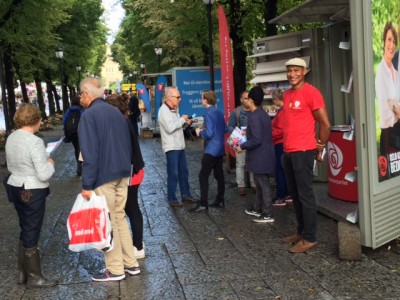The ranks of Norway’s elderly are rising rapidly, and now they’re planning some uprisings as well. Angry over inadequate nursing home care and cuts in other welfare services, the senior citizen lobby vows to be unusually active this autumn in making demands for improvement.

They’re arguably more radical than ever, with their ranks made up of many of the so-called “68ers” who were active in the social uprisings and demonstrations of the 1960s. They’ve reached retirement age now, are generally more vigorous and healthier than their predecessors were in earlier generations, and they’re accustomed to being heard. Members of Parliament and both state and local government officials can expect a series of organized protests.
“This fall we’ll see quite a few elders in uproar and mounting revolts,” Tore Nyseter, a member of Oslo’s main elder council (Det sentrale eldrerådet i Oslo) wrote in newspaper Dagsavisen late last month. “It’s time for other elders to wake up, too.”
Many already have. In July, around 70 elderly residents of Oslo’s Furuset district braved pouring rain to protest how 183 people wanting or needing to move to a nursing home were turned down, because the city was cutting capacity to save money. Some people already living in nursing homes were suddenly told they’d be moved to other facilities, because their ward was being closed. Newspaper Aftenposten reported how protesters booed when a city official who addressed them claimed there was a need to reduce nursing home capacity.
According to Nyseter, the biggest source of unhappiness is the serious criticism regarding portions of elder care in Norway that’s been documented in reports from the State Auditor General’s Office (Riksrevisjonen), the state health authority Helsetilsynet and the Center for Human Rights (Senter for menneskrettigheter). Nursing homes and most elder care programs are run by the local communities where they’re located. Standards vary widely and now the state is working to develop a means of securing more uniform care and services nationwide.

Bård Hoksrud, “elder general” for the Progress Party that shares state government power with the Conservatives, unveiled a report in late August also showing wide differences in waiting lists for a room at a nursing home. Municipalities in Rogaland County scored best, with 96 percent of those granted a room actually able to move in with 15 days. Telemark County was worst, at only 68.5 percent. Hoksrud was also unhappy because there were still no answers about how long it took from when an application was submitted until a room was granted.
There have also been a string of media reports in recent months about the shortage of nursing home rooms for those needing them and deficient care for those who have one. There have been cases of elderly nursing home patients suffering from malnutrition because they don’t receive enough help or encouragement to eat.
Emphasis on care at home
One major problem is the lack of private options to the subsidized public-sector nursing homes administered by local governments. The public sector facilities are not free either, with residents generally required to pay up to 80 percent of their income while their assets are untouched. Even many affluent elderly Norwegians, however, balk at the idea of often having to pay more than that for private care services. After a lifetime of paying relatively high taxes in Norway, they expect the “cradle to grave” social welfare system to take care of them when needed.
Most all municipalities in Norway now try to keep elders in their own homes for as long as possible, with varying degrees of success. While many elderly themselves prefer to keep living at home as well, growing numbers need help to do so, and the so-called hjemmehjelp system is also overburdened. That’s another topic for planned demonstrations.

In Oslo, the Conservative coalition that had run city government for 17 years was voted out last year in favour of a Labour Party-led government that rode to power on a platform of improving both day care for children and elder care. Labour even campaigned for introduction of property tax in Oslo, promising that revenues generated from it would be earmarked for elder care. The tax was quickly imposed this year, and that contributed to the anger and feelings of betrayal when the Labour-led city government closed nursing home wards instead of expanding them.
It’s all resulted in the unrest that’s threatened the “elder uproar” this autumn. It also has resulted in grass-roots movements like a Facebook page called Verdig eldreomsorg (Dignified elder care) that has more than 60,000 followers and aims to spread information about both negative and positive sides of Norwegian elder care.
Meanwhile, there have been other complaints as well, from myriad cases of age discrimination to the digital divide that is leaving many elderly feeling disenfranchised. Banks are shutting down branches that were popular and important for elderly customers who don’t own computers and can’t bank online. Many elderly also prefer using cash instead of credit or debit cards, but minibanks (automated teller machines) are disappearing as well.
“First I lost my bank branch and now I’m losing my post office too,” sighed one older woman waiting at the Solli Plass post office in Oslo before it closed earlier this year. She may be among those out protesting this autumn.
newsinenglish.no/Nina Berglund

